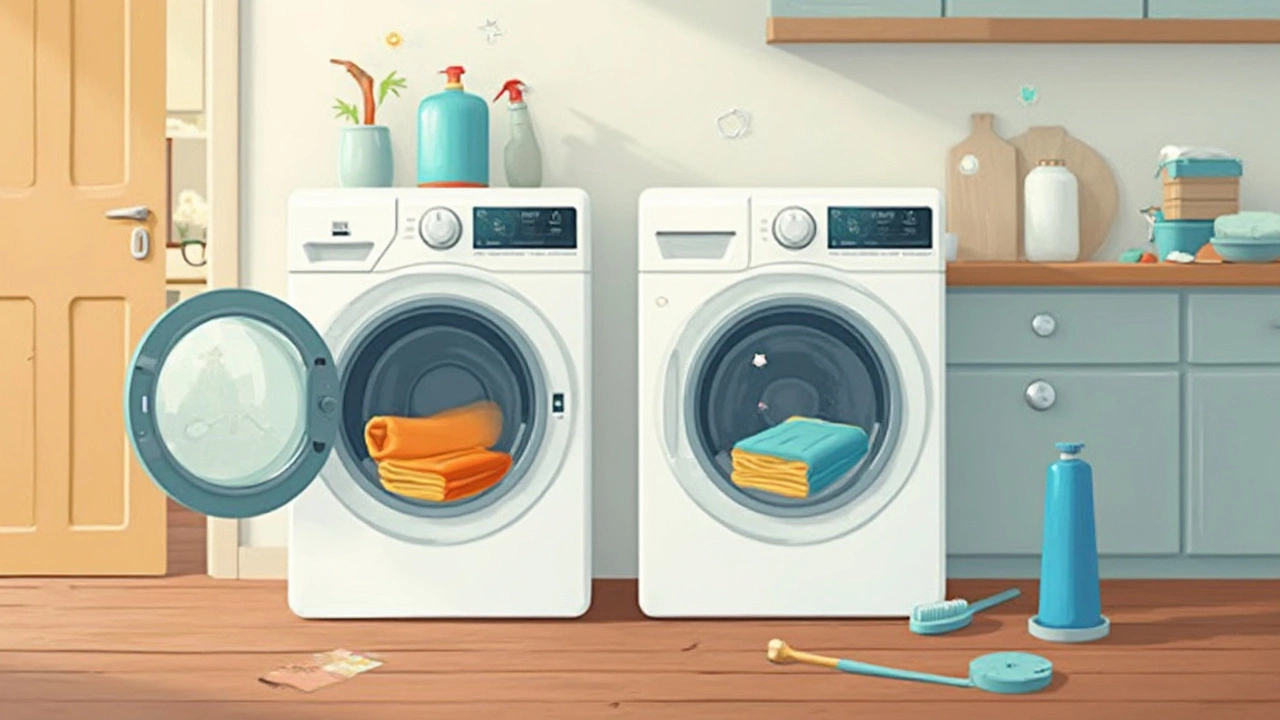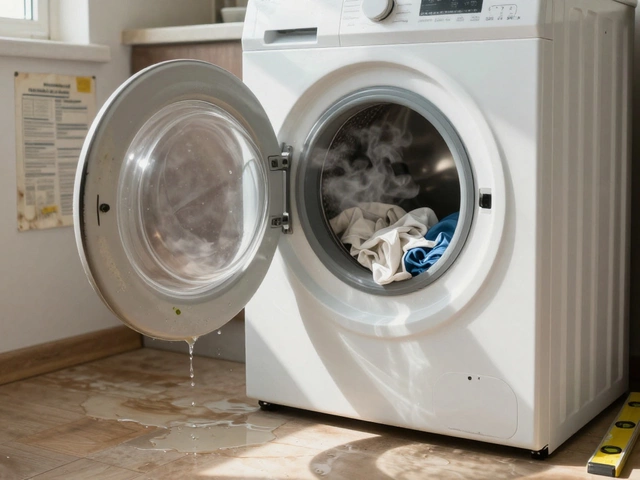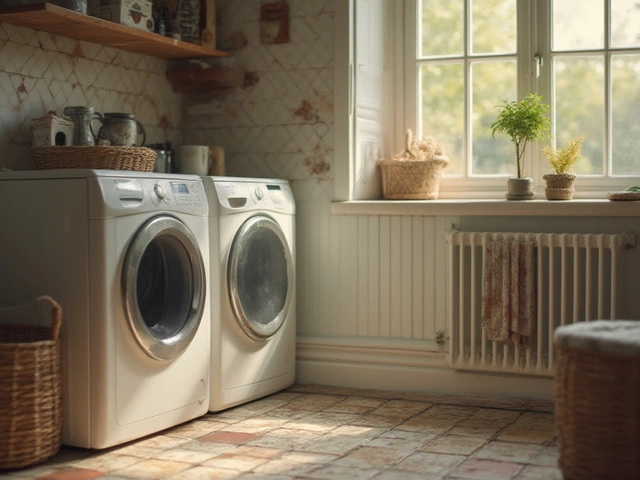Here's the truth—if your washing machine clocks in at 10 years old or more, you're already beating the odds. Most washers today last somewhere between 8 and 12 years, but that's only if you give them a little love (and don’t treat them like a punching bag on laundry days). It’s not unusual for someone to get 15 years out of a solid model, but expecting that without regular care is wishful thinking.
The crazy part? The number of loads you do matters way more than the calendar. If you’re running laundry for a big family, you're putting way more wear and tear on each cycle. And if you move a lot or have teenagers who pack the washer till it groans, you’re boosting the chance of an early breakdown.
So, why does any of this matter? Knowing how long a washer should last helps you decide if it’s actually worth repairing that weird rattling noise or splurging on a new one. Plus, you’ll usually spot the warning signs if you know what’s normal and what’s not. Let’s get into the stuff most appliance manuals never tell you.
- What's the Typical Lifespan?
- Why Do Washing Machines Break Down?
- Care Tips to Make It Last
- Repair or Replace: Which Makes Sense?
- Old-School vs. New School Washers
- Myths About Washer Longevity
What's the Typical Lifespan?
Most people hear different numbers tossed around, but the usual washing machine lifespan sits at roughly 10 years. You'll see both the United States Department of Energy and appliance repair companies say the same thing: expect 8 to 12 years if you’re using your washer the average amount—which means about seven loads a week.
If you look closer, here’s how it breaks down by type:
| Washer Type | Average Lifespan (Years) |
|---|---|
| Top-load (agitator style) | 8-12 |
| High-efficiency top-load | 10-14 |
| Front-load | 10-15 |
Cheaper machines tend to tap out at the lower end of that range. More expensive or "heavy-duty" washers, especially from brands like Speed Queen, sometimes hit the 15-year mark or even longer. Of course, that’s only if you’re not using it like it’s a commercial laundromat.
Your warranty can tell you a lot, too. If it’s only covering the first year, the manufacturer’s not banking on their washer lasting much longer without trouble. When you see multi-year warranties on the motor or drum, that usually means the real guts of the machine are built for more years of use.
Here are a few signs your washer might be reaching the end of its prime:
- Wash cycles keep getting louder or longer than they used to
- Drum doesn’t spin or drain properly, even after repairs
- Visible rust or leaking from under the washer
- Your electricity or water bill goes up (a sign it’s working too hard)
Wondering how your washer stacks up? Check the manufacture date—usually on a sticker around the door area. If it’s creeping up on a decade and giving you trouble, you might want to start thinking about a replacement.
Why Do Washing Machines Break Down?
Washing machines might seem tough, but they're loaded with moving parts and electronics that take a pounding over time. Some parts break more often than others, and it's not always just bad luck. Here are the usual suspects when it comes to breakdowns:
- Washing machine lifespan drops fast with overloading. Stuffing the drum until you can barely close the door puts too much strain on the motor, bearings, and suspension.
- Using way too much detergent (or the wrong kind) creates soap buildup, gumming up hoses and sensors. It can also mess with water levels, which can fry your water pump or even short out the control board.
- Leaky hoses and loose connections are classic issues. If you never check hoses for cracks, one can burst or drip and lead to mold, electrical shorts, or even floods on your laundry floor.
- Neglecting to clean the lint filter or coin trap can cause stuff to get stuck in the drain pump. One stray sock in the wrong place, and suddenly the whole thing backs up.
- Hard water is a silent killer—minerals build up inside valves and around the heating element, making your washer work harder and age faster.
- Electronics in newer washers are more sensitive. Power surges or dampness can fry touch panels and control boards way before old-school knobs ever failed.
If you’re curious about what actually fails most often, check out this data from a real appliance repair survey for washers:
| Component | Percent of Reported Failures |
|---|---|
| Water pump | 29% |
| Door latch or switch | 18% |
| Bearing/drum | 14% |
| Control board | 12% |
| Hoses or valves | 9% |
| Other electronics | 8% |
| Motor | 10% |
If your machine is making grinding noises, leaking water, refusing to spin, or starting to smell weird, chances are high you’ve got trouble in one of these spots. Most of these are fixable unless the cost is just too high, or the machine is already near the end of its expected years.
Care Tips to Make It Last
If you want your washing machine lifespan to hit double digits, regular care is non-negotiable. Most breakdowns come from simple things people skip, not from actual defects. Here’s what actually works in the real world:
- Don’t overload the drum. If you cram it full, the motor and bearings take a beating. Clothes won’t even get clean with the washer packed to the max. Stick to what your machine’s manual recommends—usually about three-fourths full.
- Level it out. If your washer wobbles, it’s slowly shaking itself apart. Check the adjustable feet so the machine sits flat, and use a level if you have to.
- Keep the door open after each load. This stops mold and that gross smell most people complain about. Moisture left in the drum can trash the rubber seals way before their time.
- Clean the gasket once a month. For front-loaders, gunk gathers behind the door seal and breeds bacteria fast. Wipe it down with a simple mix of water and a little vinegar.
- Run a maintenance wash every month. No clothes, hot water, plus a scoop of washing machine cleaner—or just vinegar and baking soda. This clears out detergent leftovers and prevents buildup that can hurt performance.
- Check the hoses. Inspect the inlet hoses twice a year. If they’re bulging, old, or cracked, swap them out. A busted hose means water everywhere and big repair bills.
- Avoid too much detergent. More soap doesn’t mean cleaner clothes. It just gums up the works and can cause musty smells. Use the measuring cup, not your eyeball.
Skimp on these, and your next repair bill will remind you. These steps don’t take long and are way cheaper than calling in a pro. Basically, clean it out, don’t overload, and keep an eye on the basics. That’s how you squeeze out every year possible from your washer.

Repair or Replace: Which Makes Sense?
Alright, so your washer’s making weird noises, or maybe it just quit spinning. Do you pay for a fix or just buy a new one? Here’s how to break it down—without second-guessing every dollar.
First, look at the age of your machine. If it’s under 8 years old and you haven’t dumped a small fortune into it already, odds are a repair makes sense. Most replacement parts aren’t that pricey for common issues, like a broken pump or belt. But if your washer is pushing a decade or more, don’t expect miracles from repairs—they’re more like bandaids than solutions.
Cost matters too. A good rule? If the repair bill is more than half the price of a brand-new model, skip it. Put that cash toward an upgrade instead. Just take a look at these average numbers so you know what you’re dealing with:
| Repair Type | Average Cost (USD) |
|---|---|
| Replacing pump | $200–$350 |
| Replacing belt | $120–$250 |
| Electronic control board | $250–$400 |
| New washer (mid-range) | $650–$900 |
Another factor—how often do you need repairs? If things are breaking every few months, that’s a signal it’s time to let go. Most folks only need a repair once every three or four years on a **washing machine lifespan** that’s normal. If you’re outpacing that, you’re burning time and money.
- Still under warranty? Go for the repair. Brands like LG and Samsung sometimes offer 10-year warranties on select parts, so check your paperwork.
- Leaking tub or major motor trouble? Replacement is usually smarter. Those repairs come close to the price of a new unit, and it’s just not worth it.
- Looking for better energy savings? Newer washers use up to 25% less energy and less water than models from 10 years ago.
Stuff gets sentimental, but treat laundry like a business decision. If you keep patching up a machine on its last legs, you’ll spend more than if you just bought a reliable replacement. Remember, a strong washer isn’t just about age—maintenance and repair history really do shape how long your machine can stick around your laundry room.
Old-School vs. New School Washers
Here’s something you’ll hear a lot: “My grandma’s washer lasted 25 years!” And honestly, there’s some truth to that. Old-school (pre-2000s) washers didn’t have computers or loads of sensors. They were built with chunky, plain parts that were easy to fix if something broke. Fast-forward to now, and modern washers come loaded with touch panels, WiFi, and loads of plastic components. That’s cool for convenience, but not so great if you care about old-school washing machine lifespan.
| Washer Era | Average Lifespan | Common Issues |
|---|---|---|
| Old-School (pre-2000s) | 12-20 years | Belt wear, pump failure (but easy, cheap fixes) |
| New School (2000s+) | 8-12 years | Electronics glitches, control board failure, expensive repairs |
Don’t just take my word for it—Consumer Reports nails it:
"Older washing machines were built like tanks. New models focus on features, efficiency, and cost at the expense of pure durability."
The real trade-off is that new washers use less water and energy, which keeps bills down. But when these newer models break, they often need special parts or a pricey technician to get them up and running. It’s not just a quick swap of a broken belt anymore.
- Old-school washers can handle overloading and messy repairs much better. You could swap out a worn belt in an afternoon.
- New-school models are gentle on clothes and have extra options like steam cleaning or remote start, but if the motherboard fries, fixing it costs almost as much as buying a new washer.
- Finding parts for old washers is getting tricky, though. Manufacturers want you buying new, not fixing old workhorses from the ‘90s.
If you love high-tech features or want to save money on utilities, new washers make sense. But don’t expect as many years out of them. If you snag a working classic, treat it well—you could easily double the average with regular tune-ups.
Myths About Washer Longevity
People love to pass around wild advice about washing machine lifespan. It's easy to think your grandma's old Maytag was built to last forever and your modern one is junk after five years. The truth sits somewhere in the middle, and believing in laundry legends can cost you money or lead to mistakes.
One super common myth: "It doesn't matter how much laundry you do—a good washer will last 20 years." Nope. Washing machine lifespan is more about cycles than years. The more loads you run, the quicker things wear out. A 2023 survey from Consumer Reports found that heavy users (five or more loads a week) cut typical washer life by around 25%.
Check out this quick table showing what actually chips away at a washer’s life:
| Factor | Effect on Washer Lifespan |
|---|---|
| Leaving wet clothes in the machine | Mold growth, seals wear faster |
| Using too much detergent | Residue causes mechanical issues |
| Ignoring strange noises/leaks | Problems snowball into breakdowns |
| Skipping annual cleanings | Build-up ruins inner parts |
| Overloading the drum | Stress on motor and bearings |
Another classic: "Repairs on old washers are always worth it—they’re built better." Not necessarily. Parts for machines over 10 years old often cost more, and newer high-efficiency models can cut your water and power bills by 40% according to the Department of Energy.
"Just because your last washer lasted 20 years doesn’t mean the next one will, especially if it’s working overtime or isn’t maintained. Routine care, not just brand, is key." — Tech specialist quoted in Family Handyman, April 2024
And don't get sucked in by claims like, "All modern washers break after five years." Warranty data shows most reputable brands have similar failure rates up until the 8-to-10-year mark. After that, repairs start to outpace the cost of a new washer.
- If you hear rumors that front-loaders always break faster—nope. While front-loaders need regular cleaning, studies by Yale Appliance in 2024 show their average lifespan is almost identical to top-loaders.
- Thinking that fancy digital controls break faster? Sure, there are more components, but unless you routinely power cycle your house or live somewhere with surges, controls aren’t usually the first thing to go.
The best takeaway? Don’t base your washing machine moves on outdated stories. Makes decisions based on how you use your washer, real stats, and advice from trusted sources, not just what your neighbor says.




